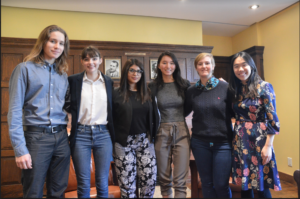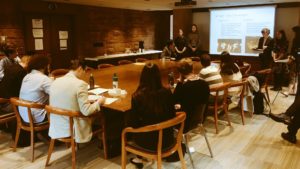“You have been contracted by Immigration, Refugees, and Citizenship Canada to resettle two thousand refugees scheduled to arrive mid-2018. Ready... Set... Go!”
These were the words echoed through the room as the Munk One Case Competition of 2017 officially started. On November 6 and 7, the annual case comp took place at UofT where current Munk One students were given 24 hours to find an intervention pertaining to a particular issue. Each team was provided with a student and professional mentor that could provide insight and feedback; the teams would then present before a panel of judges and a winning intervention would be chosen.
This year’s winning team is “Food for Thought”. Here are the personal blogs of the winning team’s experiences.
Naomi Butterfield:
Throughout the case competition our team (Food for Thought) learnt not only about how to successfully conquer issues within a group and our intervention initiative, but as a team we learnt how to use our individual strengths as assets to the project. The efficiency with which we reached our solution relied entirely upon the speedy onset of ideas and then the division between members who were willing and able to specialize and research separate areas of the problem. Despite the original thought that we would be up working all through the night, this efficiency meant that by 6pm we were able to split up and simply work on a shared presentation for the following morning. Due to this extra time that we won through efficient organisation, we had the available time to practise our presentations, make sure we specifically vocalised the most vital traits of our initiative and give each other feedback on our presentation methods.

The Munk One Case Comp winning team with their student mentor, Uma. Left to right: high school student Caleb, Lucinda, Uma, Hui Wen, Naomi, and Elizabeth.
The dynamic of the team was truly vital in order to reach our conclusions, which could never have been reached through a self-assigned group. Because of this pleasant dynamic within a group which was able to cover all vital components of the research and implementation, we did not stumble over any particularly devastating issues – save for a few moments when we were over budget, which was however easily solved. Working in such a symbiotic environment with such intelligent people was truly the route to our success.
Lucinda Hilbert:
Going into the case comp I was nervous and had no idea what to expect. I knew that my peers in Munk One were extremely competitive, and many of them had far superior crisis and public speaking experience than I. However, once they began reading off the groups, I was immediately excited. Our group was female dominated with Uma as our strong leader. We all collaborated flawlessly and didn’t reach any conflicts within the team. There was consistent collaboration and group leadership. We were able to utilize each of our own past experiences and relate it to the problem at hand, such as being a first or second generation immigrant, living in a country with a large refugee settlement population, or going to a school in a low-income area.
Really, the conceptualization and implementation of our idea came from personal experiences and values, which is why we were able to be not only pragmatic, but thorough and efficient in out creation. We were able to have most of our work done in a timely manner, and received great help from our professional mentor, Helton Achaye, who worked extensively with the refugee settlement project Matthew House in Toronto, and had much relevant advice on food and culture and the importance of social integration, cultural pride, and sharing.
Throughout the day (and night) our group worked almost flawlessly, not only as Munk One students, but also with the integral help of Caleb, our Harvard Collegiate ambassador. I am so grateful for the whole experience, and would highly recommend this competition to anyone. The exhilaration, stress, and time-crunch were all taking in stride and with pleasure with the help of great mentors, and ultimately, with great friends.
Elizabeth Shaw
In a whirlwind 24 hours, this year’s Munk One cohort was tasked with finding an innovative solution to a relevant and pressing issue. Fortunately, our ‘Food for Thought’ group — Hui Wen, Lucinda, Naomi, Caleb, and I — were up to the challenge. We began by choosing to address the themes of education and social integration, then we selected a target demographic. Children at the elementary school age were easiest to approach, we decided, as they would be the youngest of their families to be living in Canada. But what about the rest of their families? How could we create a program that could reach all two thousand refugees? There were so many questions we wanted to address, it seemed overwhelming at first. Later on, we found the answer was not having just one, but two, programs; one for children attending selected elementary schools, the other for the larger community.
Our first program was built off the existing infrastructure of school Nutrition Clubs, but with a twist. Once a week, a volunteer would come in and cook the students a breakfast that related to their backgrounds. They would provide an introduction before the kids dug in, explaining the significance of the dish to them, and their culture. The second program was a monthly Culture Night, to be hosted at elementary schools. These initiatives invited everyone in the community, regardless of age or background, to celebrate different cultures, and to perhaps break pre-disposed stereotypes they may have had. There would be a different theme each Culture Night, with events spanning from panel discussions to performances to potlucks. And while we acknowledged there were limitations to these programs, we tried our best address them during the presentation.
I really enjoyed participating in this year’s case competition, especially with my ’Food for Thought’ group. Once we had decided on our programs, everything started to come together. Also, special shoutout to our high school student, Caleb, for balancing the budget. We really could not have done it without you!
Hui Wen
Going into the annual Munk One Case Competition, I had upper years telling me to be prepared to work around the clock, that it was a great chance to bond with my peers, and a worthwhile Munk tradition to be a part of. Luckily for our group, we found the latter two scenarios to be true. As the first batch of Arts & Science Faculty students to have a week-long Fall reading week, the Case Competition early in the week gave us the adrenaline kick we needed to be productive for the rest of the week, and a chance to visit home after. The topic this year was about resettling refugee families within Toronto, an issue I found both timely and important, given the many misconceptions people have surrounding this issue. Something that particularly reshaped how I thought about it came from our keynote speaker, James Madhier, a refugee himself. He told us that Canadians are generally incredibly sympathetic, but this leads to an undermining of the lived-experiences and abilities refugees have, and a mischaracterization of refugees as being inherently weak or vulnerable. The group I was working with decided that changing this narrative is crucial to promoting acceptance into society, and decided to set up an intervention that would allow refugees to share their worldly experiences. With the understanding that most refugees have families with children and that we only had $1 million in hypothetical funding to impact 2000 refugees, we decided to focus on children enrolled in the public school system and their families. We built on the existing infrastructure of nutrition programs that exist in schools to introduce a weekly cultural food program, in which refugee parent volunteers and local volunteers come and serve a food from their place of origin to these children, while also teaching them about the region. There was also a monthly “culture nights” component, in which dinner would be served, alongside with performances of dance, music, or other traditions in partnership with community organizations.
I had anticipated the groupwork to be much more high-intensity, but everyone contributed equally great ideas and special skills to make our vision work. I found the brainstorming process to be extremely positive and encouraging; everyone respected and built upon ideas contributed by others to make our intervention truly a representation of what mattered to each and every one of us. While of course it isn’t perfect, the fact that we were able to balance equity with a time-crunch was great positive reinforcement given that the second semester of the Munk One program involves creating a similar intervention. Understanding the basics of making a pitch to an actual panel of professionals and getting their feedback was also incredibly helpful. Out of all the positive experiences I had with the competition, I have to say that the most significantly positive part of it was being able to draw on the diverse knowledge, experiences, and skills everyone I worked with had to offer. The ability for Munk One to bring together students who are so unique to solve global challenges is the real beauty of the program, and I’m so glad I get to play my role in it.
Caleb Woolcott:
(Each year, the Munk One Case Comp invites 5 high school students to partake and join the teams of Munk One students. Caleb is currently attending Harbord Collegiate Institute)
The competition topic, resettling refugees, was interesting but also very complicated. There are so many intricacies to consider and so many thin lines to walk. My group wanted to design our intervention around education and social integration (two of the topics in the competition guide). We decided very quickly to focus on some kind of school program for refugee children.
The first plan was to run many programs making certain schools very welcoming to refugees. We brainstormed: craft programs, nutritional programs, educational lunch programs, in-class workshops, culture nights, and childcare programs. All that would be way too expensive so we decided to just focus on a nutritional program one day a week and culture nights once per month. We each worked on parts of the plan: the justification, the measurables and budget, the impact, and the operational details. Everybody came together and did their part. It all went very well and I learned so much through the required research, talking with group mentors and listening to the keynote presentation.
My friends, who were also picked for the competition, and I were slightly intimidated going into a program with university students. But my team was nice and accepting, they made me feel so comfortable. Over the two days, I learned so much from them about our topic, university life and the Munk program.
I’m so thankful for my group – we worked so well together and there were no conflicts. Our student mentor was also really helpful, giving advice on everything from our program’s feasibility to my speaking speed for the presentation. Our professional mentor was such a nice person, offering some very important insights and ideas that helped work out the major kinks in our idea. The judges were fantastic, they were not afraid to call us out when they saw problems. I learned so much from them about the details of the refugee system in Canada, possible program funding models, and the proper vocabulary to use when discussing this issue. I am grateful for the great experience!
Congratulations to all teams for a successful case competition!
